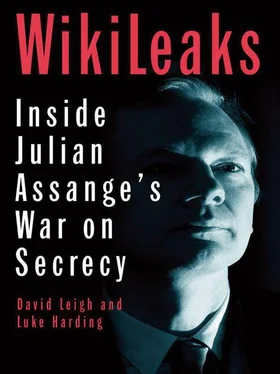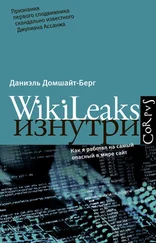Harding, Luke - WikiLeaks - Inside Julian Assange's War on Secrecy
Здесь есть возможность читать онлайн «Harding, Luke - WikiLeaks - Inside Julian Assange's War on Secrecy» весь текст электронной книги совершенно бесплатно (целиком полную версию без сокращений). В некоторых случаях можно слушать аудио, скачать через торрент в формате fb2 и присутствует краткое содержание. Жанр: Старинная литература, на английском языке. Описание произведения, (предисловие) а так же отзывы посетителей доступны на портале библиотеки ЛибКат.
- Название:WikiLeaks: Inside Julian Assange's War on Secrecy
- Автор:
- Жанр:
- Год:неизвестен
- ISBN:нет данных
- Рейтинг книги:3 / 5. Голосов: 1
-
Избранное:Добавить в избранное
- Отзывы:
-
Ваша оценка:
- 60
- 1
- 2
- 3
- 4
- 5
WikiLeaks: Inside Julian Assange's War on Secrecy: краткое содержание, описание и аннотация
Предлагаем к чтению аннотацию, описание, краткое содержание или предисловие (зависит от того, что написал сам автор книги «WikiLeaks: Inside Julian Assange's War on Secrecy»). Если вы не нашли необходимую информацию о книге — напишите в комментариях, мы постараемся отыскать её.
WikiLeaks: Inside Julian Assange's War on Secrecy — читать онлайн бесплатно полную книгу (весь текст) целиком
Ниже представлен текст книги, разбитый по страницам. Система сохранения места последней прочитанной страницы, позволяет с удобством читать онлайн бесплатно книгу «WikiLeaks: Inside Julian Assange's War on Secrecy», без необходимости каждый раз заново искать на чём Вы остановились. Поставьте закладку, и сможете в любой момент перейти на страницу, на которой закончили чтение.
Интервал:
Закладка:
In January 2011 Washington was forced to withdraw its ambassador from Libya, Gene Cretz. Colonel Gadaffi had clearly been stung by comments concerning his long-time Ukrainian nurse – a “voluptuous blonde”, as Cretz put it. Other US diplomatic staff were also quietly told to pack their bags and move on. Sylvia Reed Curran, the charge d’affaires in Ashgabat, was reassigned after penning an excoriating profile of Turkmenistan’s president, Gurbanguly Berdymukhamedov. She described him as “vain, suspicious, guarded, strict, very conservative”, a “micro-manager” and “a practised liar”. She added, memorably: “Berdymukhamedov does not like people who are smarter than he is. Since he’s not a very bright guy, our source offered, he is suspicious of a lot of people.”
Curran’s fate? She was sent to Vladivostok, where the sun rarely shines.
Some other developments were positive and suggested that WikiLeaks’ mission to winkle out secrets might help bring results. One cable, from the US embassy in Bangladesh, showed the British government was training a paramilitary force condemned by human rights organisations as a “government death squad”, held responsible for hundreds of extrajudicial killings. The British were revealed to be training the “Rapid Action Battalion” in investigative interviewing techniques and “rules of engagement”. Since the squad’s exposure in the cables, no more deaths have been announced.
In Tunisia, the country’s repressive president, Zine al-Abidine Ben Ali, blocked the website of a Lebanese newspaper that published cables about his regime. The reports from the US embassy in Tunis were deeply unflattering, and made no bones about the sclerotic state of the small Maghreb country, widely considered one of the most repressive in a repressive region. “The problem is clear,” wrote ambassador Robert Godec in July 2009, in a secret dispatch released by Beirut’s al-Akhbar newspaper. “Tunisia has been ruled by the same president for 22 years. He has no successor. And, while President Ben Ali deserves credit for continuing many of the progressive policies of [predecessor] President Bourguiba, he and his regime have lost touch with the Tunisian people. They tolerate no advice or criticism, whether domestic or international. Increasingly, they rely on the police for control and focus on preserving power.”
The cable went on: “Corruption in the inner circle is growing. Even average Tunisians are keenly aware of it, and the chorus of complaints is rising. Tunisians intensely dislike, even hate, first lady Leila Trabelsi and her family. In private, regime opponents mock her; even those close to the government express dismay at her reported behaviour. Meanwhile, anger is growing at Tunisia’s high unemployment and regional inequities. As a consequence, the risks to the regime’s long-term stability are increasing.”
The ambassador’s comments were prescient. Within a month of the cable’s publication, Tunisia was in the grip of what some were calling the first WikiLeaks revolution.
CHAPTER 17
The ballad of Wandsworth jail
City of Westminster magistrates court,
Horseferry Road, London
7 December 2010
“ I walked, with other souls in pain ”
OSCAR WILDE, BALLAD OF READING GAOL
If aliens had landed their spaceship outside, they might have presumed that one of God’s saints was about to ascend. Julian Assange had just become, in many eyes, the St Sebastian of the internet age, a martyr pierced by the many arrows of the unbelievers. A scrum of cameramen thronged the gates of the City of Westminster magistrates court. On the pavement a polyglot huddle of journalists waited impatiently to get in. Other reporters had managed to sneak inside and they milled around the ground-floor vestibule.
The previous evening Swedish prosecutors had decided to issue a warrant for Assange’s arrest, over the still unresolved investigation into allegations he had assaulted two women in Stockholm. He was listed as a wanted man by Interpol – wanted, the Red List notice said, for “sex crimes”. That night, sitting in the Georgian surroundings of Ellingham Hall, and with his options rapidly narrowing, Assange had concluded that he was going to have to hand himself in. He had scarcely slept for days; he was under siege from the world’s media; the way forward must have seemed rocky and difficult. According to his WikiLeaks associates, after taking the decision to go to the police Assange at last fell heavily asleep.
Early that morning he drove to London. There, he met at 9.30am with officers from the Metropolitan police’s extradition unit. The meeting had been arranged in advance; Assange was with his lawyers Mark Stephens and Jennifer Robinson. The officers promptly arrested him. They explained they were acting on behalf of the Swedish authorities. The Swedes had issued a European arrest warrant, valid in Britain. It accused Assange of one count of unlawful coercion, two counts of sexual molestation and one count of rape, all allegedly committed in August 2010. Westminster magistrates court would decide later that afternoon whether to grant him bail, they said.
News of his arrest prompted some rejoicing in Washington, which had found little to cheer about in recent days, as the contents of its private diplomatic dispatches were sprayed around the world. “That sounds like good news to me,” said the US defence secretary, Robert Gates, speaking from Afghanistan. There was a big smirk on his face.
At 12.47pm Assange slipped into court via a back entrance. Stephens told the waiting media his client was “fine”. He had held a successful meeting with police. “It was very cordial. They verified his identify. They are satisfied he is the real Julian Assange and we are ready to go into court.” But the rest of the afternoon’s proceedings didn’t go according to plan. In a beige upstairs courtroom, the district judge Howard Riddle asked Assange whether he consented to his extradition to Sweden. Was he ready to answer the charges in the arrest warrant? “I understand that, and do not consent,” Assange replied. The judge then asked Assange to give his address. Assange fired back: “PO Box 4080.”
It was the kind of apparently flippant answer you might expect from a global nomad. Assange was, after all, an international man of mystery who moved from country to country, carrying only a couple of rucksacks with computer gear and a slightly rank T-shirt. As his friends well knew, getting hold of Assange was exceptionally difficult. But in fact, his answer may not have been as flippant as it sounded. He had not known what to expect in the courtroom, and was nervous about giving away his location in public for fear of ill-wishers. He would have been better-advised to ask to submit his true current address written down on a piece of paper. That would have been perfectly normal.
As it was, his answer entertained the gallery, but dissatisfied the court. Riddle made it clear he was not here to pass judgment on Assange’s Manichean struggle with the Pentagon or other dark forces: “This case isn’t about WikiLeaks.” After hearing a brief outline of the evidence from Sweden the judge concluded that Assange’s community ties in the UK were weak. The prosecution also claimed – unreasonably as it later turned out – that it was unclear how Assange had entered Britain. Judge Riddle concluded there was a risk Assange might not show up for his extradition hearing – or, in colloquial British parlance, do a runner. He refused Assange bail.
The decision at 3.30pm was an unexpected hammer-blow. Assange had confidently expected he would be free to walk out of court. He had even failed to bring a toothbrush. There would be no triumphant press conference, however; instead Assange was carted off in a “meat wagon” to HM Wandsworth prison, his new home. This forbidding ensemble of grey Victorian buildings might have come from the pages of Charles Dickens. It proved to be an excellent setting for another reel in what would surely become Assange’s biopic. His life story already had the trajectory of a thriller. But now it had an unexpected change of pace, with a sequence to come on its protagonist’s suffering and martyrdom. Nelson Mandela, Oscar Wilde, Alexander Solzhenitsyn (Assange’s hero), all had spent time in prison. They had used their confinement to meditate and reflect on the transitory nature of human existence and – in Solzhenitsyn’s case – on the brutalities of Soviet power. Now it was Assange’s turn to be incarcerated, as some saw it, in a dank British gulag.
Читать дальшеИнтервал:
Закладка:
Похожие книги на «WikiLeaks: Inside Julian Assange's War on Secrecy»
Представляем Вашему вниманию похожие книги на «WikiLeaks: Inside Julian Assange's War on Secrecy» списком для выбора. Мы отобрали схожую по названию и смыслу литературу в надежде предоставить читателям больше вариантов отыскать новые, интересные, ещё непрочитанные произведения.
Обсуждение, отзывы о книге «WikiLeaks: Inside Julian Assange's War on Secrecy» и просто собственные мнения читателей. Оставьте ваши комментарии, напишите, что Вы думаете о произведении, его смысле или главных героях. Укажите что конкретно понравилось, а что нет, и почему Вы так считаете.












